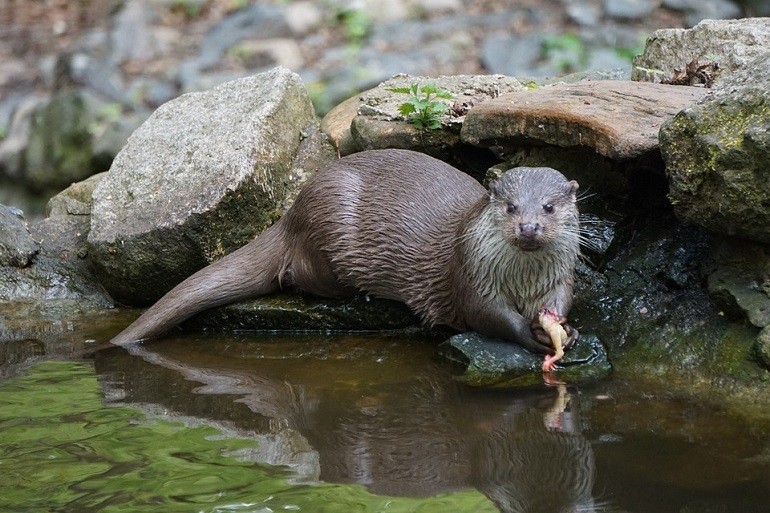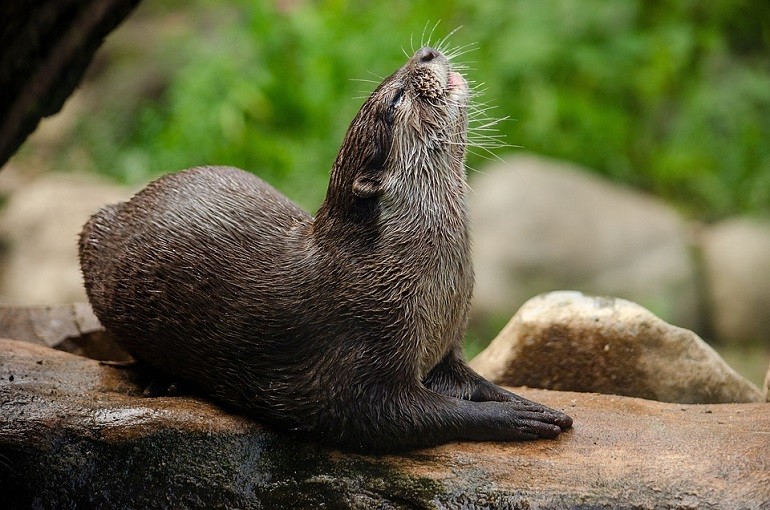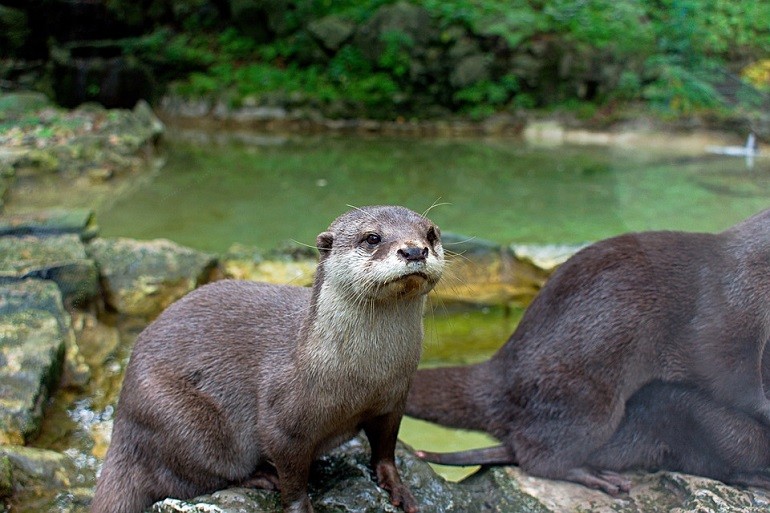How Much Is An Otter Pet? The rising trend of keeping otters as pets has sparked much curiosity, but before you jump on the bandwagon, PETS.EDU.VN wants you to dive deep into the realities, legality, and costs associated with otter ownership. Consider this your comprehensive guide, exploring ethical considerations, providing insights into the unique needs of these semi-aquatic creatures, and offering alternative pet options. Learn about otter care, otter price, and otter ownership.
1. Unveiling the Allure and Challenges of Otter Ownership
Otters, with their playful antics and endearing appearance, can seem like ideal companions. However, prospective owners must understand the complexities involved in caring for these wild animals.
1.1. The Reality Behind the Cuteness
Otters are far from domesticated animals; they are wild creatures with innate behaviors and requirements that are difficult to meet in a domestic setting.
- Natural Habitat: Understanding their natural habitat is crucial. Otters thrive in aquatic environments and require ample space to swim, forage, and socialize.
- Behavioral Needs: These intelligent animals need constant mental and physical stimulation, which can be challenging to provide in a typical household.
1.2. The Ethical Dilemma
The demand for pet otters has led to a surge in illegal poaching, particularly of Asian small-clawed otters, impacting wild populations and ecosystems.
- Conservation Concerns: Supporting the exotic pet trade contributes to the decline of otter populations in their natural habitats.
- Animal Welfare: Otters kept as pets often suffer from stress, loneliness, and inadequate care, leading to compromised well-being.
2. Delving into the Legal Landscape of Otter Ownership
Before considering otter ownership, it’s essential to navigate the complex legal landscape, which varies significantly depending on your location.
2.1. International Regulations
Many countries have strict regulations or outright bans on keeping otters as pets, reflecting concerns about conservation and animal welfare.
- CITES Protection: The Convention on International Trade in Endangered Species (CITES) regulates the trade of certain otter species, aiming to protect them from overexploitation.
- Country-Specific Laws: Regulations vary widely, with some countries requiring permits or licenses for otter ownership, while others prohibit it altogether.
2.2. United States Regulations
In the United States, otter ownership laws vary from state to state, with some states allowing it under specific conditions and others prohibiting it entirely.
- State-Specific Laws: It’s crucial to research your state’s laws and regulations regarding exotic animal ownership, including any permits or licenses required.
- Federal Laws: The Marine Mammal Protection Act protects sea otters, making it illegal to own them without proper authorization.
3. Unpacking the Financial Implications of Otter Ownership
Owning an otter is a significant financial commitment, with costs extending far beyond the initial purchase price.
3.1. Acquisition Costs
The price of an otter can range from $3,000 to $5,000, depending on the species, age, and source.
3.2. Habitat and Enclosure Costs
Providing a suitable habitat for an otter requires a substantial investment, including:
| Item | Description | Estimated Cost |
|---|---|---|
| Enclosure | A large, secure enclosure with ample space for swimming, foraging, and climbing. | $5,000 – $10,000 |
| Pool/Water Feature | A deep pool or water feature that allows the otter to dive and swim freely. | $2,000 – $5,000 |
| Landscaping | Natural elements such as rocks, logs, and vegetation to mimic the otter’s natural habitat. | $1,000 – $3,000 |
| Filtration System | A robust filtration system to maintain water quality and prevent the build-up of harmful bacteria and algae. | $500 – $1,500 |
| Heating/Cooling | Depending on the climate, you may need to provide heating or cooling to maintain a comfortable temperature for the otter. | $200 – $1,000 |
| Total | The total cost of creating a suitable otter enclosure can range from $8,700 to $20,500, depending on the size and complexity of the design. |



3.3. Dietary Costs
Otters have a specialized diet that can be expensive to maintain, requiring a variety of fresh seafood, meat, and supplements.
| Food Item | Description | Estimated Monthly Cost |
|---|---|---|
| Fresh Seafood | A variety of fish, crustaceans, and mollusks. | $300 – $500 |
| Meat | Lean meats such as chicken, turkey, and beef. | $100 – $200 |
| Supplements | Vitamins and minerals to ensure the otter receives a balanced diet. | $50 – $100 |
| Total | The monthly cost of feeding an otter can range from $450 to $800, depending on the otter’s size and appetite. |
3.4. Veterinary Care Costs
Otters require regular veterinary check-ups and vaccinations, as well as specialized care in case of illness or injury.
| Veterinary Service | Description | Estimated Cost |
|---|---|---|
| Annual Check-up | A comprehensive physical examination and vaccination update. | $100 – $300 |
| Dental Cleaning | Regular dental cleaning to prevent dental disease. | $200 – $500 |
| Emergency Care | Treatment for unexpected illnesses or injuries. | $500 – $5,000+ |
| Total | The annual cost of veterinary care for an otter can range from $800 to $5,800 or more, depending on the otter’s health and any unexpected medical needs. |
3.5. Enrichment and Entertainment Costs
Otters need constant mental and physical stimulation to prevent boredom and behavioral problems, requiring a variety of toys, activities, and enrichment items.
| Enrichment Item | Description | Estimated Cost |
|---|---|---|
| Toys | Durable toys such as balls, puzzle feeders, and floating toys. | $50 – $100 per month |
| Activities | Activities such as swimming, foraging, and exploring new environments. | Varies |
| Training | Professional training to teach basic commands and address behavioral issues. | $50 – $100 per session |
| Total | The monthly cost of providing enrichment and entertainment for an otter can range from $100 to $200 or more, depending on the otter’s individual needs and preferences. |
4. Understanding the Unique Care Requirements of Pet Otters
Otters have highly specialized care requirements that demand significant time, effort, and expertise.
4.1. Nutritional Needs
Otters require a varied diet consisting of fresh seafood, meat, and supplements to meet their specific nutritional needs.
- Species-Specific Diets: Different otter species have different dietary preferences and requirements, so it’s essential to research the specific needs of your otter.
- Proper Supplementation: Otters may require vitamin and mineral supplements to ensure they receive a balanced diet, particularly if their diet is lacking in certain nutrients.
4.2. Environmental Needs
Otters need a large, secure enclosure with access to clean water for swimming, foraging, and playing.
- Water Quality: Maintaining water quality is crucial to prevent the build-up of harmful bacteria and algae.
- Temperature Regulation: Otters need a comfortable temperature range, which may require heating or cooling depending on the climate.
4.3. Social and Behavioral Needs
Otters are social animals that thrive in groups and need constant mental and physical stimulation.
- Companionship: Otters may become lonely and stressed if kept in isolation, so it’s essential to provide them with companionship, either from other otters or from humans.
- Enrichment: Otters need a variety of toys, activities, and enrichment items to keep them mentally stimulated and prevent boredom.
5. Addressing the Health Concerns Associated with Otter Ownership
Otters are susceptible to various health problems, some of which can be zoonotic, meaning they can be transmitted to humans.
5.1. Common Health Issues
Otters are prone to various health issues, including:
- Parasitic Infections: Otters can be infected with various parasites, such as roundworms, tapeworms, and flukes.
- Respiratory Infections: Otters are susceptible to respiratory infections such as pneumonia and bronchitis.
- Dental Disease: Otters are prone to dental disease, such as tartar build-up, gingivitis, and tooth decay.
5.2. Zoonotic Diseases
Otters can carry zoonotic diseases that can be transmitted to humans, such as:
- Salmonella: Salmonella is a bacterial infection that can cause diarrhea, fever, and abdominal cramps.
- Leptospirosis: Leptospirosis is a bacterial infection that can cause fever, headache, muscle aches, and jaundice.
- Giardia: Giardia is a parasitic infection that can cause diarrhea, abdominal cramps, and bloating.
5.3. Preventative Care
Regular veterinary check-ups and vaccinations are crucial to prevent health problems and ensure the otter’s well-being.
6. Exploring Alternative Pet Options
If you’re drawn to otters but are concerned about the ethical, legal, and practical challenges of ownership, several alternative pet options offer similar companionship and enjoyment.
6.1. Ferrets
Ferrets are playful and intelligent animals that can make wonderful pets for the right owner.
- Social Needs: Ferrets are social animals that need companionship, either from other ferrets or from humans.
- Enrichment: Ferrets need a variety of toys, activities, and enrichment items to keep them mentally stimulated and prevent boredom.
6.2. Domestic Rats
Domestic rats are intelligent, affectionate, and easily trained, making them ideal companions for those seeking a small, low-maintenance pet.
- Social Needs: Domestic rats are social animals that thrive in groups and need companionship, either from other rats or from humans.
- Enrichment: Domestic rats need a variety of toys, activities, and enrichment items to keep them mentally stimulated and prevent boredom.
6.3. Cats and Dogs
Cats and dogs are popular pets that offer companionship, affection, and entertainment.
- Variety of Breeds: There are numerous breeds of cats and dogs to choose from, each with its unique personality and characteristics.
- Training and Socialization: Cats and dogs can be trained to perform tricks and commands, and they can be socialized to get along with other animals and people.
7. Conservation Efforts and Responsible Pet Ownership
Supporting conservation efforts and practicing responsible pet ownership is crucial to protect otters and their habitats.
7.1. Supporting Conservation Organizations
Donating to conservation organizations that work to protect otters and their habitats can help ensure their survival.
7.2. Responsible Pet Ownership
If you choose to own a pet, research the animal’s needs and provide it with proper care, including:
- Proper Housing: Providing a safe, secure, and stimulating environment.
- Balanced Diet: Feeding a balanced diet that meets the animal’s specific nutritional needs.
- Veterinary Care: Providing regular veterinary check-ups and vaccinations.
- Enrichment: Providing enrichment items and activities to keep the animal mentally and physically stimulated.
8. How Much Does it REALLY Cost? A Detailed Breakdown Table
| Expense Category | Initial Cost | Recurring Monthly Cost | Notes |
|---|---|---|---|
| Acquisition | $3,000 – $5,000 | $0 | Cost to purchase the otter (if legal and ethical). |
| Enclosure | $5,000 – $10,000 | $50 – $100 | Includes pool, filtration, and landscaping. Recurring costs for maintenance and cleaning. |
| Diet | $0 | $450 – $800 | Specialized diet of fresh seafood, meat, and supplements. |
| Veterinary Care | $100 – $300 | $50 – $200 | Regular check-ups, vaccinations, and potential emergency care. Costs can vary greatly. |
| Enrichment | $100 – $200 | $50 – $100 | Toys, activities, and training to keep the otter mentally stimulated. |
| Total (Estimated) | $8,200 – $15,500 | $600 – $1,200 | These are just estimates. Actual costs can vary widely depending on location, species, and individual otter needs. Does not include potential legal fees. |
9. Updated Information on Otter Care and Conservation
Stay informed about the latest advancements in otter care and conservation by consulting reputable sources such as:
- Veterinary Journals: Veterinary journals publish research on otter health and disease.
- Conservation Organizations: Conservation organizations provide information on otter conservation efforts and population trends.
- Wildlife Rehabilitation Centers: Wildlife rehabilitation centers offer insights into otter care and rehabilitation techniques.
10. Frequently Asked Questions (FAQs) About Otter Ownership
10.1. Is it legal to own an otter in my state?
Otter ownership laws vary from state to state, so it’s crucial to research your state’s laws and regulations regarding exotic animal ownership.
10.2. How much does it cost to feed an otter?
The monthly cost of feeding an otter can range from $450 to $800, depending on the otter’s size and appetite.
10.3. What do otters eat?
Otters have a specialized diet that includes fresh seafood, meat, and supplements.
10.4. How big of an enclosure does an otter need?
An otter needs a large, secure enclosure with ample space for swimming, foraging, and climbing. A suitable enclosure is around 60 square meters.
10.5. Are otters good pets for children?
Otters are not generally recommended as pets for children due to their wild nature and potential for aggression.
10.6. Do otters bite?
Otters can bite if they feel threatened or stressed.
10.7. Are otters noisy?
Yes, otters are known to be noisy animals, making various vocalizations such as squeaks, growls, and chirps.
10.8. Do otters smell?
Otters have scent glands that produce a strong odor, which some people find unpleasant.
10.9. Can otters be house-trained?
Otters are difficult to house-train and may require specialized training and management.
10.10. What are some alternative pets to otters?
Alternative pets to otters include ferrets, domestic rats, cats, and dogs.
In conclusion, while the allure of owning an otter is undeniable, it’s crucial to consider the ethical, legal, financial, and practical challenges involved. Otters are wild animals with highly specialized needs that are difficult to meet in a domestic setting. PETS.EDU.VN encourages potential pet owners to research thoroughly and consider the well-being of the animal before making a decision. If you’re passionate about animal welfare and conservation, support organizations that work to protect otters and their habitats.
If you’re seeking more information on responsible pet ownership, alternative pet options, or conservation efforts, visit PETS.EDU.VN or contact us at 789 Paw Lane, Petville, CA 91234, United States, or WhatsApp at +1 555-987-6543. We’re here to help you make informed decisions and provide the best possible care for your animal companions. Learn more about otter diets at pets.edu.vn.